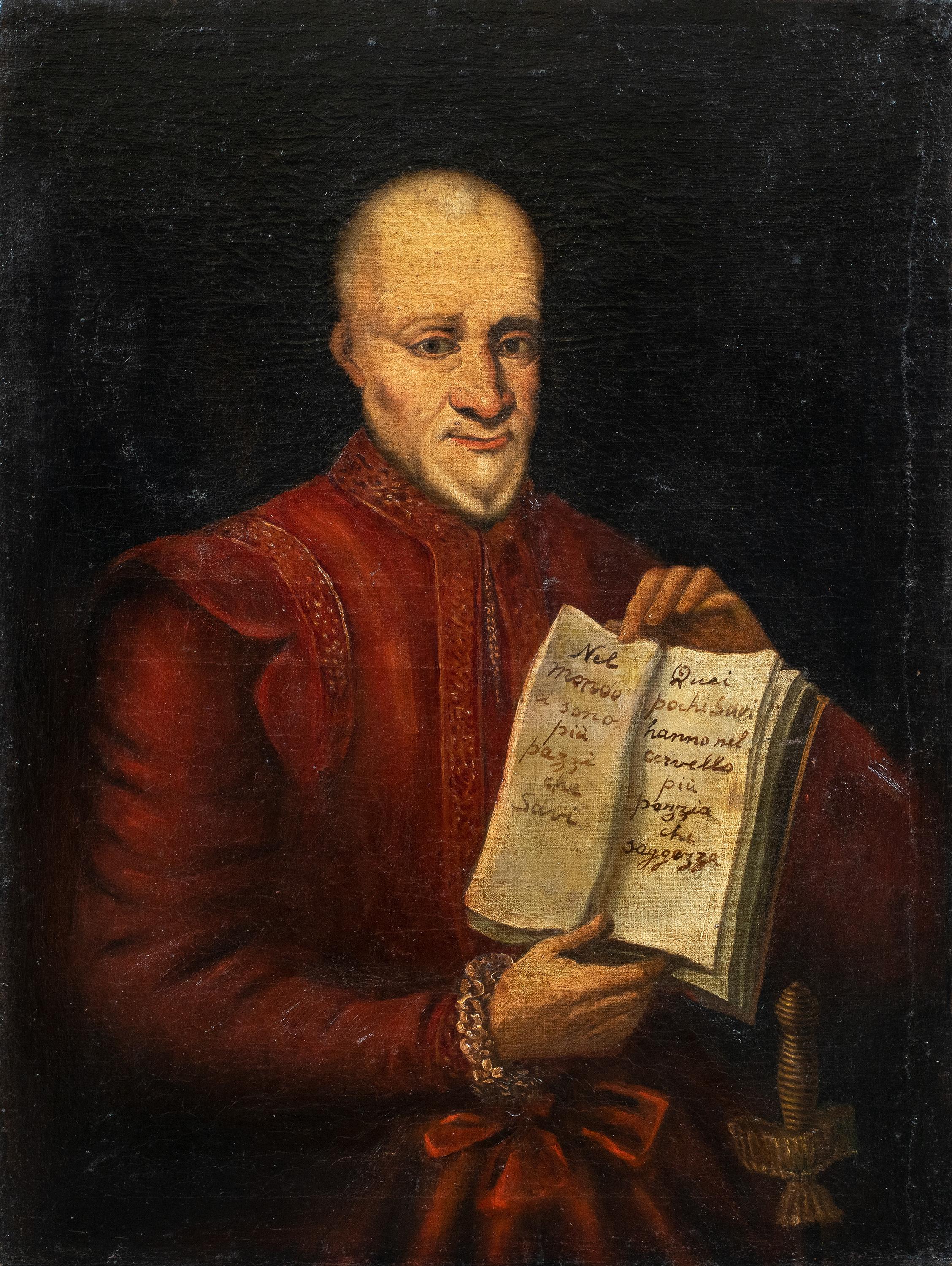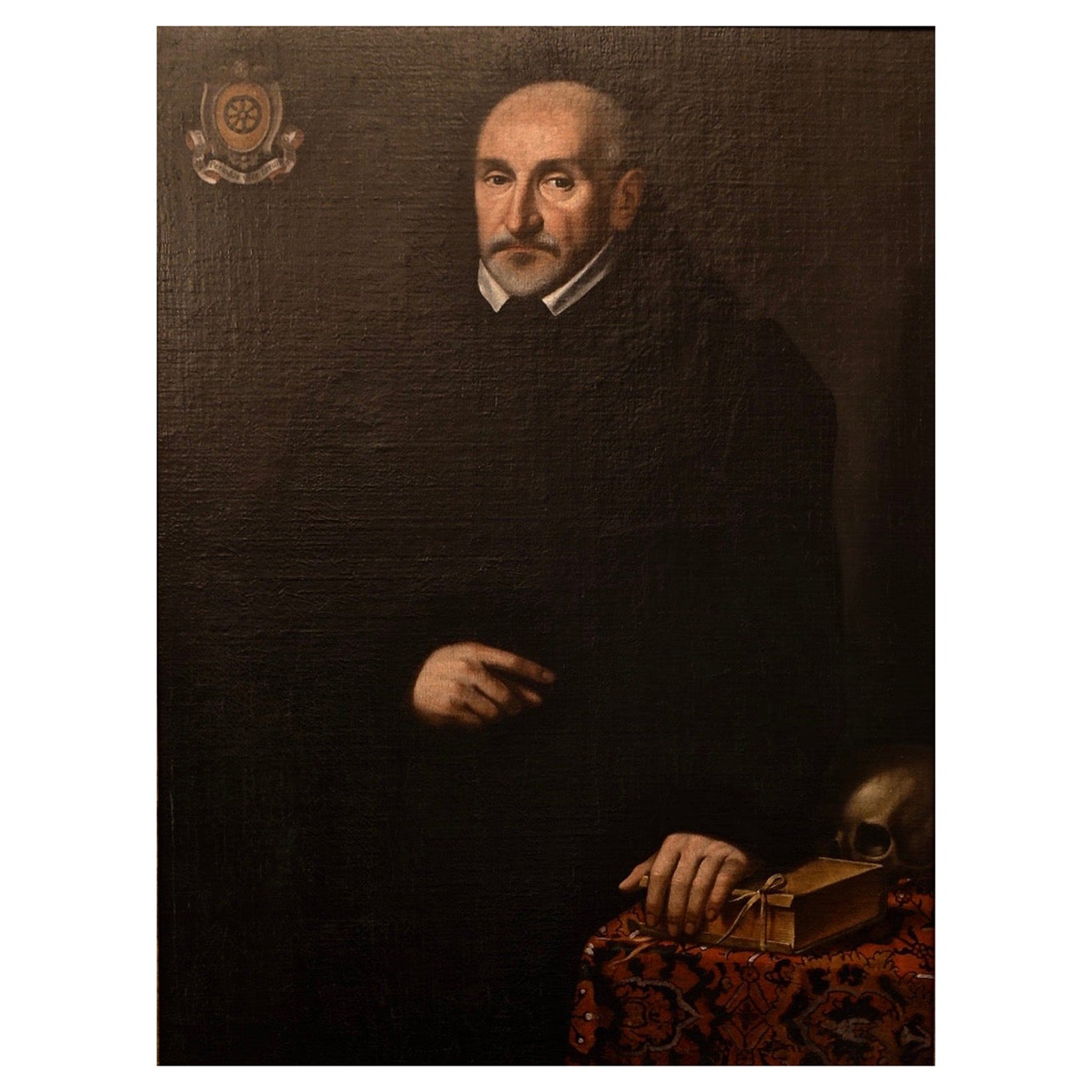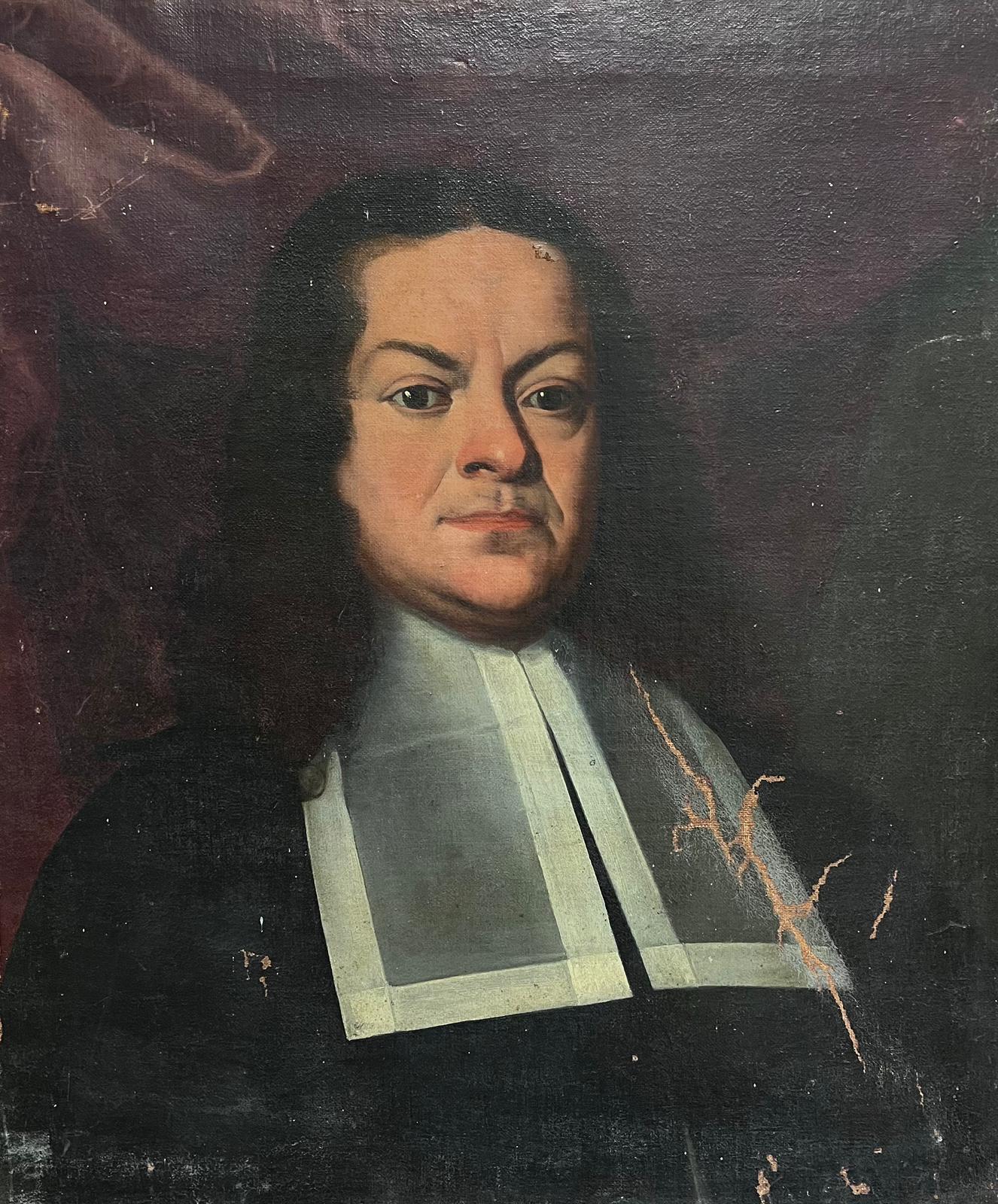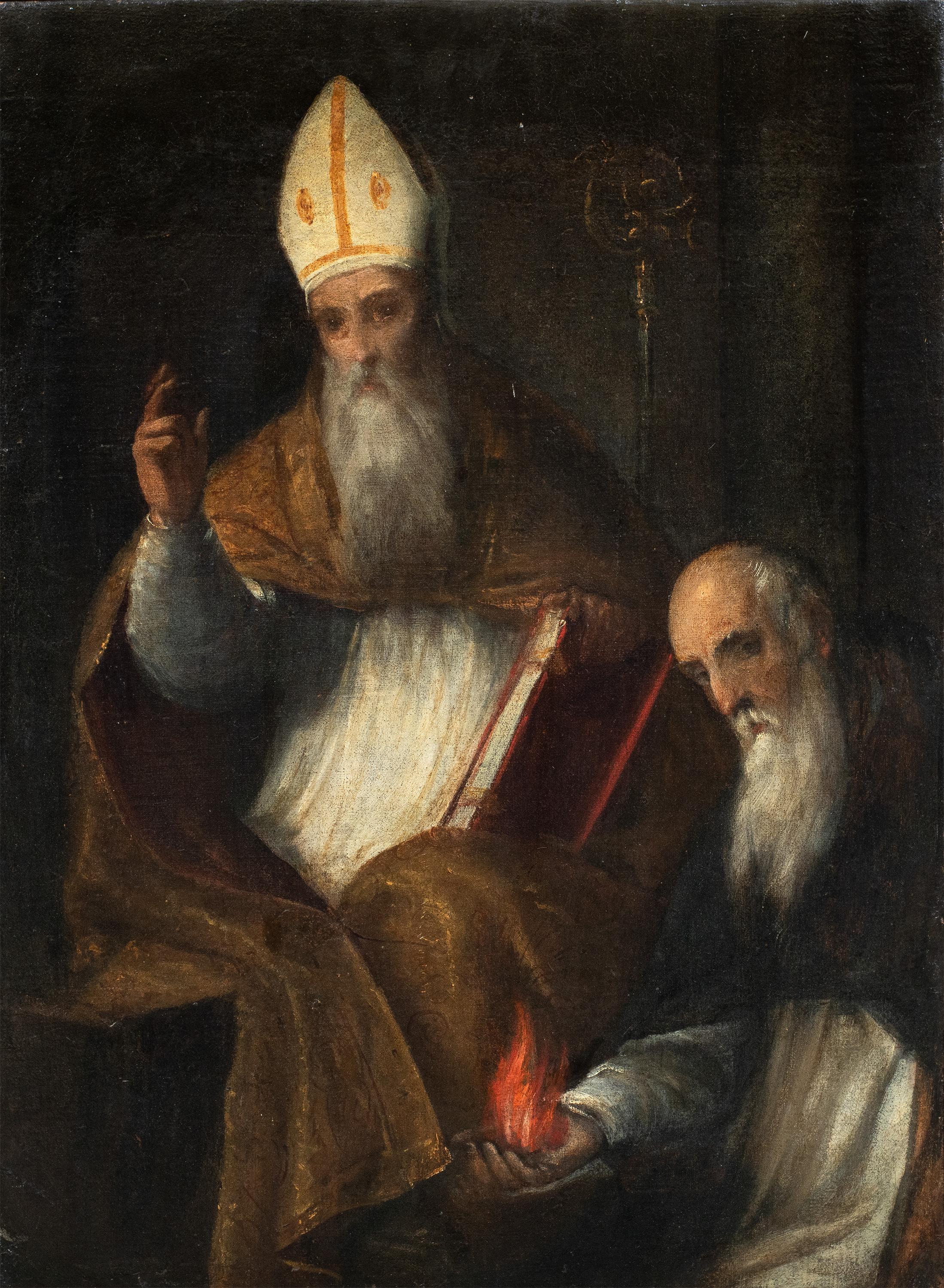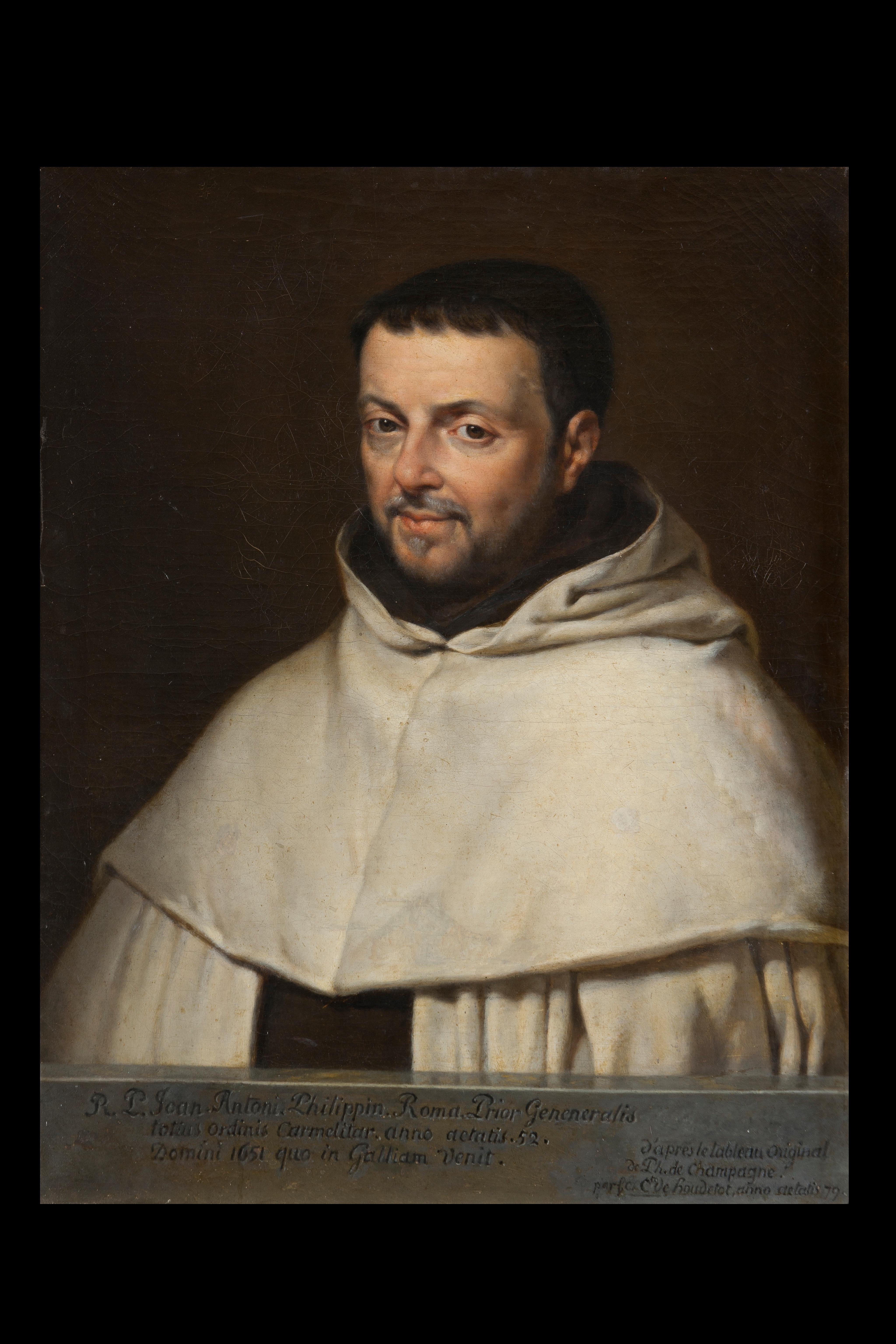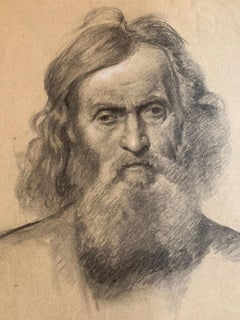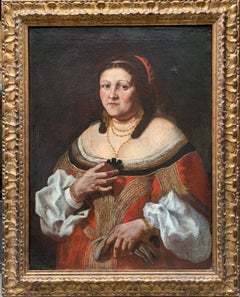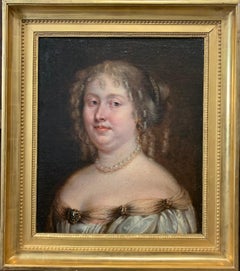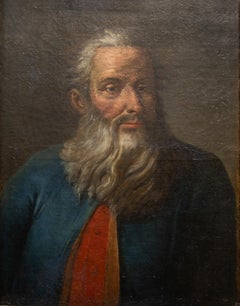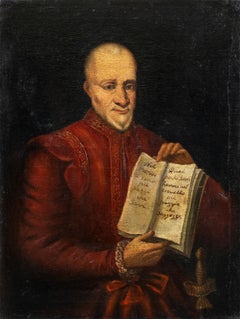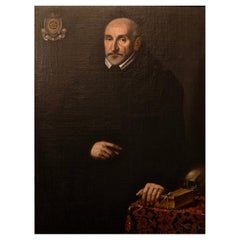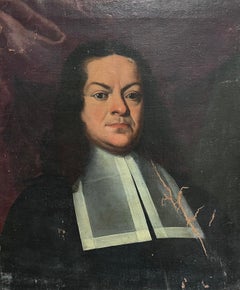Items Similar to Spanish school. Secretary of Pope Pius V, abbot of Husillos, bishop of Córdoba.
Video Loading
Want more images or videos?
Request additional images or videos from the seller
1 of 17
UnknownSpanish school. Secretary of Pope Pius V, abbot of Husillos, bishop of Córdoba.
$1,530.84
$1,913.5520% Off
£1,129.34
£1,411.6720% Off
€1,280
€1,60020% Off
CA$2,119.21
CA$2,649.0120% Off
A$2,297.84
A$2,872.3020% Off
CHF 1,219.44
CHF 1,524.3020% Off
MX$28,300.82
MX$35,376.0320% Off
NOK 15,114.15
NOK 18,892.6920% Off
SEK 14,264.28
SEK 17,830.3520% Off
DKK 9,745.32
DKK 12,181.6520% Off
About the Item
Portrait of Francisco de Reynoso y Baeza.
Secretary of Pope Pius V, abbot of Husillos and bishop of Córdoba. Francisci de Reynoso.
Early 17th century.
Small-format portrait from the late Renaissance period.
Spanish school.
Size: Cm 19 x Cm 13.5
Oil on wooden panel.
On the back the fine tablet is strengthened (already in ancient times) by a sheet of parchment.
About 1600-1610.
As often in Mannerist / Late Renaissance portraits, the image of the character is accompanied by the writing that runs at the top, adding a celebratory, historicising touch to the effigy. Let's bring back the sentence here:
DON FRANCISCO DE REINOSO. CAMARERO SECRETO IESCALCO PIO QUINTO OBISCOPO CORDOBA. 68 (? O 7?)
(1534, Autillo de Campos, Spain - 1601, Córdoba)
Francisco de Reynoso was a Spanish cleric, chief chamberlain, and secretary to Pope Pius V, abbot of Husillos, and bishop of Córdoba.
He was the fourth of eleven children. His father was the seventh Lord of Autillo de Campos, and his mother was Juana de Baeza y de las Casas, daughter of Manuel de Baeza, a lawyer of the Royal Council and at the Court of Valladolid.
Francisco de Reynoso was deeply devoted to the Virgin Mary and showed a strong inclination toward religion and piety from an early age.
He studied Latin, arts, and theology at the University of Salamanca.
In 1562, he traveled to Rome with his brothers Pedro and Luis.
In January 1566, following the death of Pope Pius IV, Cardinal Antonio Michele Ghislieri was elected pope, becoming Pius V. From this period until Ghislieri's death in 1572, Francisco de Reynoso served as his chief chamberlain and secretary.
After Pope Pius V died, Francisco de Reynoso returned to Spain and lived for several years in the city of Palencia, where his brother Manuel was a canon.
He supported the Society of Jesus when it was established in Palencia, providing alms to the school's clergy and funding chairs of Letters and Theology at his own expense, as well as donating a significant number of books.
During the brief outbreak of the Black Plague in 1580, he personally tended to the poor and sick in the city, bringing them food and making their beds. He also contributed to the establishment of the school for English seminarians in Valladolid.
As abbot of Husillos, he sold tapestries, silverware, carpets, and other household items to give alms, according to a 1591 report by the archdeacon of Toledo, Francisco de Ávila, to King Philip II.
In 1597, he was appointed bishop of Córdoba, on the recommendation of Philip II. During his episcopate, he completed the vault of the choir in the Cathedral of Córdoba and was known for his austerity and charity toward the poor, the sick, and prisoners.
Bishop Reynoso's family held various important positions: his brother Pedro succeeded as the eighth Lord of Autillo de Campos, his brother Manuel was a canon of the Cathedral of Palencia, his brother Miguel was governor of the city of L'Aquila in the Kingdom of Naples, and his brother Luis de Reynoso was a captain of the Tercio in Maastricht. Luis also served as a captain of one of the five companies that belonged to the flags of Naples in the Battle of Lepanto under the Tercio Costa de Granada.
In addition, in 1559, two of his sisters were condemned by the Inquisition in a unique case: his sister Catalina de Reynoso y Baeza, a nun of the convent of Belén in Valladolid, was accused of Lutheranism. In controversial statements made by other nuns of the same convent, it was claimed that she sang verses to the god Baal while they sang in the choir. Besides the accusation of Lutheranism, it was mentioned that their mother, Doña Juana de Baeza, descended from converted Jews. Catalina was sentenced to house arrest for being a fictitious confessor, confessed, and died in 1559 at the age of 21 by garrote vil before being burned. His other sister, Francisca de Reynoso (also known as Francisca de Zúñiga), was convicted of Lutheranism and burned in an auto-da-fé, permanently deprived of her active and passive vote, and confined to her convent.
Most likely, these actions were taken to eliminate the center of Lutheranism in Valladolid, led by the "Alumbrados," a Protestant group to which the family of Gonzalo Pérez de Cazalla y Vivero, husband of Inés de Reynoso y Baeza, belonged.
- Dimensions:Height: 7.49 in (19 cm)Width: 5.32 in (13.5 cm)
- Medium:
- Movement & Style:
- Period:
- Framing:Framing Options Available
- Condition:
- Gallery Location:Firenze, IT
- Reference Number:1stDibs: LU2464214502822
About the Seller
4.9
Vetted Professional Seller
Every seller passes strict standards for authenticity and reliability
Established in 2016
1stDibs seller since 2023
81 sales on 1stDibs
Typical response time: 6 hours
- ShippingRetrieving quote...Shipping from: Firenze, Italy
- Return Policy
Authenticity Guarantee
In the unlikely event there’s an issue with an item’s authenticity, contact us within 1 year for a full refund. DetailsMoney-Back Guarantee
If your item is not as described, is damaged in transit, or does not arrive, contact us within 7 days for a full refund. Details24-Hour Cancellation
You have a 24-hour grace period in which to reconsider your purchase, with no questions asked.Vetted Professional Sellers
Our world-class sellers must adhere to strict standards for service and quality, maintaining the integrity of our listings.Price-Match Guarantee
If you find that a seller listed the same item for a lower price elsewhere, we’ll match it.Trusted Global Delivery
Our best-in-class carrier network provides specialized shipping options worldwide, including custom delivery.More From This Seller
View AllAcademic Study for the Head of an Apostle or Saint
Located in Firenze, IT
Study for the Head of an Apostle or Saint
Artist: Enrico Reffo (1831-1917)
Medium: Charcoal and white chalk on colored paper
Dimensions: [To be specified]
Date: Late 19th - Early 20...
Category
Mid-19th Century Academic Portrait Drawings and Watercolors
Materials
Carbon Pencil, Charcoal, Paper
$240 Sale Price
20% Off
Portrait Of A Noblewoman. Attributed To Carlo Ceresa. About 1640.
By Carlo Ceresa
Located in Firenze, IT
Portrait of a noblewoman.
Attributed to Carlo Ceresa. (1609 - 1679, Bergamo)
Oil on canvas.
Size cm 110x86,5cm with frame
Around 1640.
This portrait depicts a middle-aged woman with great realism, typical of Lombard and Bergamo painters in particular. Carlo Ceresa, probable author of this unsigned painting, had studied with Daniele Crespi...
Category
Mid-17th Century Baroque Portrait Paintings
Materials
Canvas, Oil
$2,691 Sale Price
43% Off
Portrait of a Lady . Louis Ferdinand Elle the Younger. ( Paris, 1612-1689), attrib
By Louis Elle (Ferdinand)
Located in Firenze, IT
Portrait of a lady .
Louis Ferdinand Elle the Younger. ( Paris, 1612-1689), attributed.
Circa 1680.
Oil on canvas, resting on cardboard.
In 19th-century giltwood frame.
A female...
Category
1680s French School Portrait Paintings
Materials
Canvas, Oil, Cardboard
$2,930 Sale Price
30% Off
Free Shipping
Portrait of a Levantine Merchant, 18th Century. Italian school.
Located in Firenze, IT
Portrait of a Levantine Merchant, 18th Century
Italian school.
Oil on canvas.
Circle of Giuseppe Nogari (1699-1763)
Dimensions with frame cm 71 x 5...
Category
18th Century Baroque Portrait Paintings
Materials
Oil, Canvas
$1,913 Sale Price
20% Off
Venice. XVI century. Madonna with child with St. John. Attrib. Marco Bello.
Located in Firenze, IT
Sacred Conversation: Madonna with child with St. John with idealized landscape background with mountains.
Early XVI century.
Oil on wooden panel of Venetian conifers.
Marco Bello, attributed. (Venezia, 1470 - 1523, Udine), pupil and follower of Giovanni Bellini.
Venetian school.
Madonna with child with St. John with idealized landscape background with mountains.
Dimentions: 57cm x 68cm x 6cm
Beautiful late Renaissance frame...
Category
16th Century Renaissance Figurative Paintings
Materials
Wood Panel, Oil
Saint Anthony the Abbot in a Natural Landscape - Flemish School
Located in Firenze, IT
Saint Anthony The Abbot In A Natural Landscape. Flemish School, Late 16th - Early 17th Century
Technique: Oil on panel
Period: late 16th - Early 17th Century
School: Flemish
Dimensi...
Category
Early 17th Century Renaissance Figurative Paintings
Materials
Oil
$1,793 Sale Price
40% Off
You May Also Like
Portrait Cardinal Barberini Alberti Paint Oil on canvas 17th Century Old master
Located in Riva del Garda, IT
Antonio Alberti (1603 - 1649)
Portrait of Cardinal Antonio Marcello Barberini (Florence 1569 – Rome 1646)
Inscription on the bottom: F.M D.D ANTONIUS BARBERINUS ROM. O. CAP. S.R.E. ...
Category
17th Century Old Masters Paintings
Materials
Oil
$7,338 Sale Price
20% Off
Enlightenment Italian painter - 18th century figure painting - Portrait - Italy
Located in Varmo, IT
Italian painter (18th century) - Portrait of a gentleman with aphorism.
92 x 68 cm.
Antique oil painting on canvas, without frame (not signed).
- Inscription: "There are more madm...
Category
Mid-18th Century Rococo Figurative Paintings
Materials
Canvas, Oil
$1,789 Sale Price
25% Off
Portrait of Gentleman from Della Ruota Family, Lombardy, Dated 1624
Located in Bruxelles, BE
Portrait of a Gentleman from Della Ruota family
Lombardy, dated 1624
Oil on canvas
Measures: 105 x 81 cm (without the frame)
The coat of arms at the top left of the portrait identifies the effigy as an aristocrat belonging to the Lombard family Della Ruota, represented at the age of 61 in 1624.
The presence of vanity at the bottom right is a clear reference to the passage of time, to the aging and dying body...
Category
Antique 17th Century Italian Renaissance Paintings
Materials
Canvas
Large 1700's Italian Oil Painting on Canvas Portrait of a Clerical Gentleman
Located in Cirencester, Gloucestershire
Portrait of a Clerical Gentleman
Italian artist, mid 18th century
Circle of Giovanni Battista Carboni (1725-1790)
oil on canvas, unframed
canvas: 26 x 22 inches
provenance: private c...
Category
Mid-18th Century Old Masters Portrait Paintings
Materials
Oil, Canvas
Pietro Marescalchi Spada (Venetian) - 16th century figure painting - Saints
Located in Varmo, IT
Pietro de' Marescalchi, known as Lo Spada (Feltre 1522 - Feltre 1589) - Saint Ambrose and Saint Anthony the Abbot.
75 x 55 cm.
Ancient oil painting on canvas, unframed.
A critical...
Category
16th Century Mannerist Figurative Paintings
Materials
Canvas, Oil
19th Century By Comte d'Houdetot Portrait of GiovanniAntonioFilippini Oil/canvas
Located in Milano, Lombardia
Frédéric-Christophe, Comte d'Houdetot (Paris, France, 1778 - 1859)
Title: Portrait of Giovanni Antonio Filippini
Medium: Oil on canvas
Dimensions: without frame 72.50 x 42 cm - with ...
Category
19th Century Old Masters Portrait Paintings
Materials
Canvas, Oil
